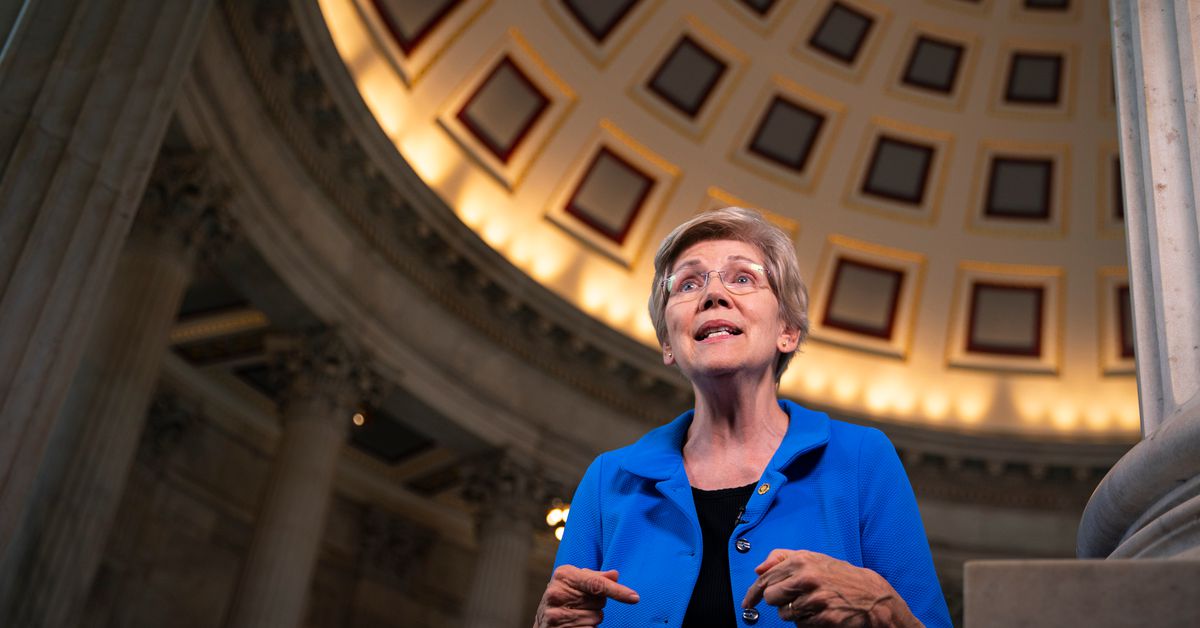Stop me if you’ve heard this one before: Sen. Elizabeth Warren has an idea for a new federal agency that takes on some of the most powerful and valuable companies in the world, aiming to protect consumers from their abusive business practices.
You’d be forgiven for assuming I’m referring to the Consumer Financial Protection Bureau, the federal agency that Warren is largely and deservedly credited with creating. No, this is about a new bill that would create another new agency: the Digital Consumer Protection Commission Act, or DCPC. Whereas the CFPB took on Big Banking, the DCPC aims to take on Big Tech, with a dedicated and specialized agency empowered to promulgate and enforce new regulations. Warren believes it will address some of Big Tech’s greatest harms, which the US has thus far failed to rein in any other way.
“Big Tech giants exploit people’s data, invade Americans’ privacy, and crush competition,” Warren told me in an interview. “The tech industry has shut down every attempt to regulate it or impose liability on it.” She added: “Enough is enough. We cannot let a handful of unelected Big Tech billionaires govern our lives and govern our democracy.”
Warren’s push for another new agency comes as we’re seeing what appears to be plenty of justification for its existence. Digital privacy and Big Tech-focused antitrust bills have largely fizzled out, despite bipartisan support for them. Congress is currently mulling over bills about online children’s safety and TikTok as a potential national security threat that may never get close to passing. On the rare occasions when these companies are held to account, even the largest fines levied against them are little more than rounding errors, easily shrugged off as the cost of doing business.
We’re also seeing what may be the limits of what our existing agencies can do. The FTC’s attempt to block Microsoft’s acquisition of video game giant Activision was recently defeated in court. The Department of Justice’s antitrust trial against Google over its search engine dominance just began, kicking off a wave of Big Tech antitrust lawsuits that will test if and how existing antitrust laws can be applied to these digital platforms. If they can’t, perhaps that will finally make the case for a new agency that can.
“People get what’s wrong. And they also get that Congress is not responding,” Warren said, adding: “Congress is slow and deliberative. The agencies can be more nimble. But to do that, they need expertise.”
A truly just society places a strong emphasis on protecting its most vulnerable members. However, in American politics since the 1980s, there has been a predominant focus on deregulation, primarily benefiting the most powerful.
The establishment of new agencies aimed at safeguarding the weakest is a positive move toward reestablishing justice.
It’s really sad that we have to rely on the EU for any sort of consumer advocacy against Big Tech. They’ve had successes with privacy, charger standardization, and maybe they’ll work on right to repair laws next. The US just rolls over to them. Lick more boots US government and courts.
I like her
I really liked her until she backstabbed Bernie. She’s still good for the most part, but I just can’t get myself to trust her again.
deleted by creator
The court case that everyone loves to spam about the DNC arguing, correctly from a legal perspective, that they have no obligation to actually allow democracy in their primaries concluded that Sanders was the primary beneficiary of DNC fuckery.
They had hoped to make Clinton look like a reasonable compromise candidate in comparison to the “unhinged commie.”
deleted by creator
deleted by creator
I’ve heard a bunch of takes lately that Hillary would have been better?
How exactly?
Trump was the first president in living memory that didn’t start a new war.
I can’t even confidently say Bernie would have not done thatdeleted by creator
He also tried to start a war with Iran by assassinating one of their generals in front of the whole world.
He’s just so bad at being President he can’t even start a war in the Middle East properly.
Projection?
I supported Bernie as much as I could.
Trump tried to start wars with Venezuela and Iran. He’s incompetent though, so they didn’t materialize.
Hillary is competent. Those wars would have happened.deleted by creator
This is the best summary I could come up with:
Stop me if you’ve heard this one before: Sen. Elizabeth Warren has an idea for a new federal agency that takes on some of the most powerful and valuable companies in the world, aiming to protect consumers from their abusive business practices.
The fact that Warren is working on this with Lindsey Graham, a Republican who hasn’t always had the nicest things to say about her (nor she of him), shows that Big Tech regulations can be a unifying issue.
Kreps also wonders if an agency set up with the goal of checking Big Tech’s power might be unnecessarily antagonistic toward what is one of the biggest drivers of the US economy and technological supremacy.
Tom Wheeler, who served as the FCC chair under Obama and is author of the upcoming book Techlash, published an extensive study on whether a digital platform agency like the one Bennet and Warren’s bills propose is necessary.
As for whether Warren and Graham’s approach is the best way to do that, Wheeler says he’s more focused on the fact that bills like this are getting more people thinking and talking about creating a digital platform agency in the first place.
NetChoice, an industry association that counts Amazon, Google, Meta, TikTok, and Twitter among its members, posted a scathing critique of the bill the day it was announced.
The original article contains 2,546 words, the summary contains 223 words. Saved 91%. I’m a bot and I’m open source!




